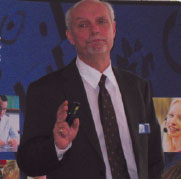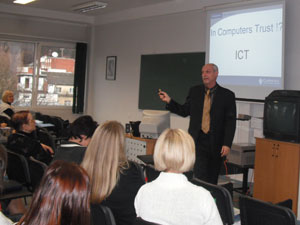About Gary Anderson

Gary Anderson was Pedagogical Director of the language program of the former American Center in Paris, and President-elect of TESOL France when he joined Cambridge ELT as International Teacher Trainer based in Paris.
He has given talks in over 50 countries on five continents, including at TESOL International and IATEFL UK. In this blog, Gary writes about the events he attends and shares some of the ideas and tips that he gives in his talks.
Blog posts
- On the Road with Gary Anderson in…Slovakia
- On the Road with Gary Anderson in…Italy
- On the Road with Gary Anderson in…Lithuania
- On the Road with Gary Anderson in…Romania, Greece and the Czech Republic
- On the Road with Gary Anderson in …Kazakhstan
- On the Road with Gary Anderson in …Switzerland
- On the Road with Gary Anderson in …Serbia
Gary's upcoming travels
- Romania: Cambridge Day, Bucharest; February 27
- Poland: Workshops in Katowice, Krakow, Szczecin, Gdansk; March 10–17
- Bosnia: Workshops in Mostar and Bijeljina; March 25–26
- Croatia: Workshops in Slavonski Brod and Osijek; March 29–30
- UK: IATEFL, Harrogate; April 7–11
- Russia: Workshops in Moscow, Nizhni, Saratov; April 11–15
- Belgium: Cambridge Day, Brussels; April 24
- Netherlands: English for Schools Day, Utrecht; April 28
Sign up for RSS feed
Read Gary's latest blog post as soon as it appears!
Blogs by Cambridge authors
Follow your favourite Cambridge authors here:
- DCBlog, David Crystal
- Bob Dignen's blog on Professional English Online
- That'SLife, Gavin Dudeney
- Andy Hockley's blog
- The Spelling blog, Johanna Stirling
On the Road with Gary in …Lithuania
At the end of November I made a tour to the three major cities of cold-ish, forest-full Lithuania for Cambridge Days in the capital Vilnius and Kaunas plus a very nice international teachers' conference in Klaipeda where I met teachers from the Czech Republic, Belorussia and neighbouring Latvia as well as from all over Lithuania. I was giving various talks at each stop including 'Ain't Nothing like the Real Thing for Skills' on the Cambridge English 'Real' Skills series and 'ELT into the Digital Age' about Web 1.0 and Web 2.0 resources available for teachers and students on www.cambridge.org/elt, Professional English Online and the new innovative 'collaborative' site English360.
Plus a workshop entitled 'Which comes first: The chicken or the egg? Language development or exam preparation?' in which we looked at the question: Shouldn't successful exam preparation courses also be solid language learning courses which offer systematic language development, skills work and learning strategies as well as exam tasks, training and tips? I used activities from the Objective series including Objective IELTS (the biggest growing Cambridge ESOL exam in many countries – including Lithuania) as examples of how to do both: to prepare students for exam success while also ensuring on-going language development in all five skills (Remember that the Common European Framework breaks speaking into spoken production and spoken interaction, as tested on Cambridge ESOL exams.).

Since I promised in a preceding post on extensive 'pleasure' reading to talk about intensive reading, let's look at that very important skill which I know students need to prepare them for university studies (my daughter who is studying psychology at a francophone university in Canada has to read lots of articles in English) and for the real world of professional life (my son who is working as a sports journalist in Paris has to read a lot in English about US/UK sports) – as well as do well in exams!
There's been lot of talk at conferences and in recent ELT literature about why students who of course can read in their native language don't transfer those skills they learn (my wife teaches her 8 year-old French pupils to skim and scan) into the target language? And people use these reading sub-skills in real life. For example, I've got a movie-buff friend who never reads complete film reviews because he thinks they'll influence his judgement of the film and/or give away too much of the plot – but I know he skims them to see what the reviewer thinks overall and then has to go back to scan to find when and where the film is playing.
During the workshops in Lithuania, we looked at what for me are the five steps in intensive reading:
- Orienting yourself to the text and predicting from extra-textual elements (title, headline, pictures, graphs).
- Identifying main ideas (skimming, like taking the best part off milk).
- Reading (mustn't forget this!).
- Identifying details and specific information (scanning, like a medical scanner searching for certain information; have your students use their finger when doing this – or pen or pencil if it's an exam).
- Going beyond the surface meaning (inference) and follow-up (doing something with the text like talking or writing about it – or answering exam questions!).
I – we, if you too are interested in the subject – must read a new book by Cambridge on the subject: Reading in a Second Language: Moving from Theory to Practice by William Grabe in the Cambridge Applied Linguistics series. And maybe that'll be the topic of my first blog for 2010 – recently published books from Cambridge to read in the New Year… For now, Best wishes for a happy holiday season to all!
Gary Anderson, Cambridge ELT International Teacher Trainer
PS. If you're teaching teenagers and would like some additional ideas about dealing with reading for them, look at my article 'Be Sensitive to…both Intensive and Extensive Reading' at on the English in Mind resource site.

